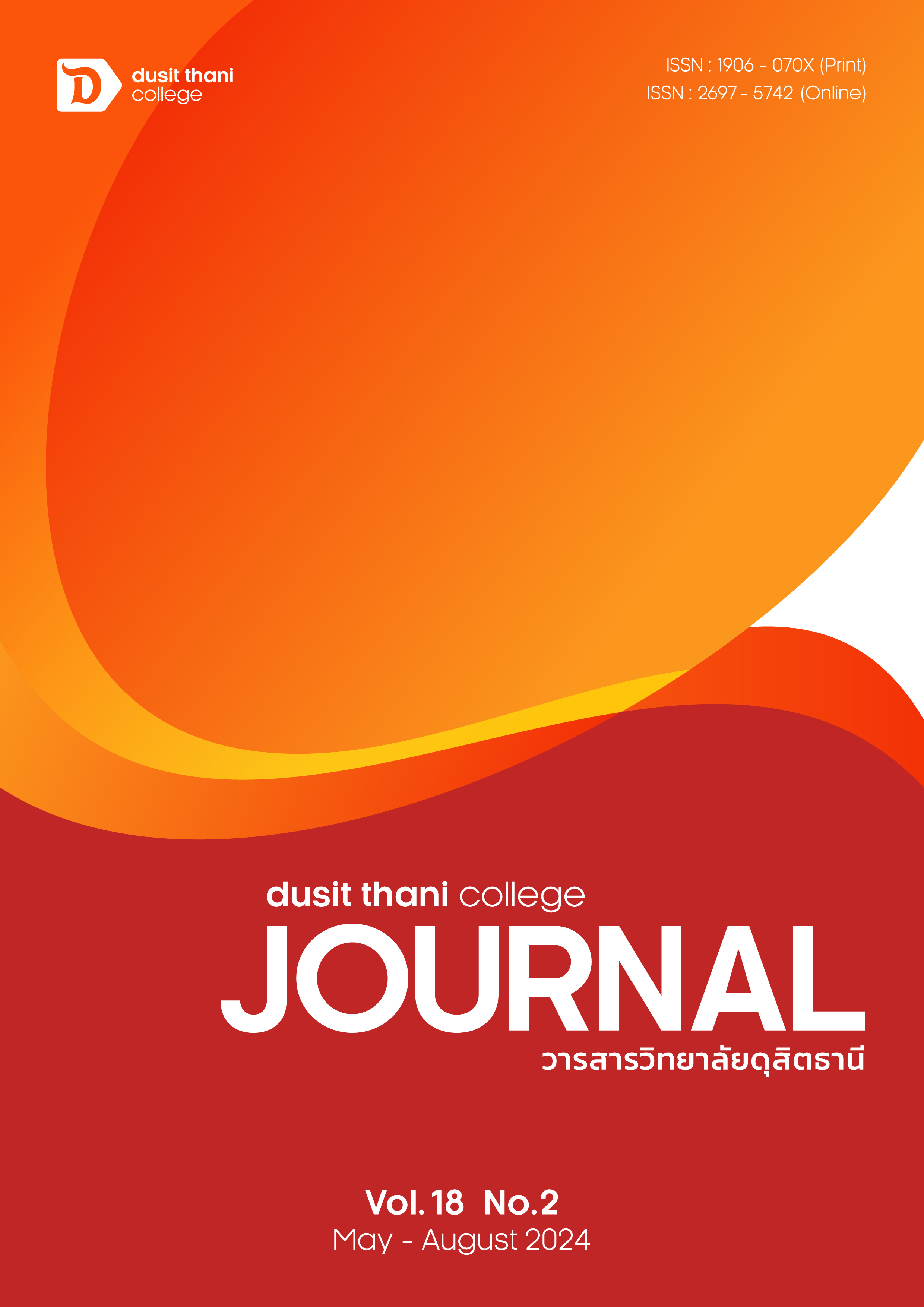Guidelines for Work-Integrated Learning in Tourism and Hospitality in Koh Samui District, Surat Thani Province
Main Article Content
Abstract
The research article aims to study the model of work-Integrated Learning management in tourism and hospitality fields in Koh Samui and student achievement from the management, investigate support factors implementing in work-integrated learning management and then developed an work-integrated learning management guidelines in tourism and hospitality in Koh Samui district using 9 focus group discussions, including participants in the work-integrated learning management in the actual establishment from 45 key informants, were selected according to the criteria set by the researchers. In conjunction with in-depth interviews from students, professors, and establishment representatives, together with relevant studies, documents, and research on data collection and analysis.
The study found that the educational institution implements three models of work-integrated learning: alternating between classroom learning and work in a department for 4 months, classroom learning followed by 3 months of work, and alternating between classroom learning and work across 3 departments for 6 months. The outcomes showed that students developed in terms of cognitive, psychomotor, and affective domains. The study identified seven supporting factors for implementing work-integrated learning in tourism and hospitality, including: students, educational institutions, teaching management, tourism and hospitality enterprises, supervisors or mentors in the workplace, students' families, and the context of Koh Samui. The guidelines for developing work-integrated learning in tourism and hospitality on Koh Samui were categorized into 7 areas: students, educational institutions, teaching management, tourism and hospitality enterprises, supervisors or mentors, students' families, and the context of Koh Samui.
Article Details

This work is licensed under a Creative Commons Attribution-NonCommercial-NoDerivatives 4.0 International License.
Article Screening Policy
- All research and academic articles to be published must be considered and screened by three peer reviews in the relevant field / article.
- All articles, texts, illustrations and tables published in the journal are the personal opinions of the authors. Editors don't always have to agree. And no responsibility whatsoever is the sole responsibility of the author.
- The articles to be published must never be published. Where did you first publish? And not in the consideration of other journals If the audit found that there has been a duplicate publication It is the sole responsibility of the author.
- Any article that the reader sees as being plagiarized or impersonated without reference. Or mislead the work of the author Please let the journal editor know it will be your greatest blessing.
References
Alongkot Yawaiy, et al. (2016). The development of a curriculum integrating continuous work-based learning throughout the undergraduate program in the field of management to meet the labor market demands in Nakhon Ratchasima Province. Bangkok: National Research Council of Thailand (NRCT) and Thailand Research Fund (TRF).
Aprile, K. T., & Knight, B. A. (2020). The WIL to learn: Students’ perspectives on the impact of work-integrated learning placements on their professional readiness. Higher Education Research & Development, 39(5), 869-882.
Aupaiboon, P. (2022). Create Creative: Elementary School Students. Music and Culture Jounal, 1(1), 1–11. (in Thai)
Buddhabhumbhitak, K., Daengbupphaand, J., & Yawai, A. (2022). Distinctive Thai Hospitality Competency for Personnel Development in Tourism and Hospitality Industry. Humanity and Social Science Journal, 14(1), 280-307. (in Thai)
Chuanprapa, T., Sanguanyat,S O, Boonchat, J., Chombuatong, S., & Moonpat, K. (2016). Development of an integrated learning model with work-based learning for service business programs in Rajabhat universities in Thailand. Bangkok: Suan Dusit University.
Cooper, L., Orrell, J., & Bowden, M. (2010). Work-integrated learning: A guide to effective practice. Routledge.
Eysenck, J., Arnold, W., & Meili, R. (1972). Encyclopedia of psychology. London: Search Press Limited.
Jittima Buamas. (2003). Attitudes and satisfaction in service (5th ed.). Bangkok: Sukhothai Thammathirat Open University.
Kerlinger, F. N. (1986). Foundations of behavioral research (3rd ed.). Holt, Rinehart, and Winston.
Nonsiri, P. (2020). The Development of Service Process with Thai Hospitality in The Tourism and Hospitality Industry. Journal of Business, Innovation and Sustainability (JBIS), 15(2), 148–164. (in Thai)
Ngamprakhon, S. (2021). Leadership of Educational change In Thailand 4.0. Mahachula Academic Journal, 8(3), 308–319. (in Thai)
Nyumba, T., Wilson, K., & Mukherjee, N. (2018). The use of focus group discussion methodology: Insights from two decades of application in conservation. Methods in Ecology and Evolution, 9, 20-32.
Nuchanart, V. (2020). The results of the teaching method of work integrated learning (Work Integrated Learning: WIL) in the subject of displays and exhibitions. Sarn Sue Sin Journal, 3(5), 67-74. (in Thai)
Khasuwan, S., Hongsiriwat, A., & Polsaram, P. (2021). Current Conditions and Problems of Work Integrated Learning Management of Learner and Graduates Major Architecture of Thailand University. Journal of Education Studies, 49(3), 1-12. (in Thai)
Lee, M., Kim, J. W., Mo, Y., & Walker, A. D. (2022). A review of professional learning community (PLC) instruments. Journal of Educational Administration, 60(3), 262-287.
Patrick, C-j., Peach, D., Pocknee, C., Webb, F., Fletcher, M., Pretto, G. (2008). The WIL [Work Integrated Learning] report: A national scoping study [Australian Learning and Teaching Council (ALTC) Final report]. Brisbane: Queensland University of Technology.
Pritadrang, J., Phitchaya, K., & Phromphong, M. (2023). Model requirement and guideline for education management of work-integrated learning of communication arts program, Loie Rajabhat university. Journal of Education Thaksin University, 23(1), 63–76. (in Thai)
Sarojni, C. and Brian, D. (2011). Partnerships between universities and workplaces: some challenges for work-integrated learning. Studies in Continuing Education, 33(2), 157-172. (in Thai)
Sitthipitaks, M., Tachaphahapong, S., & Polsaram, P. (2021). Key Success Factors of Sustainable Green University. Journal of Education Studies, 49(2), EDUCU4902006-10. (in Thai)
Tantiboonyanont, S. (2021). Ubiquitous learning guidelines for work-integrated learning students. Journal of Graduate Studies Review MCU Phrae Campus, 7(1), 246–259. (in Thai)
Vongkaew, P., Yodsurang, S., Chareonputch, V., & Chaosaengrat, C. (2022). Skilled labor apprenticeship enhancing National capacities advantages Thailand. Journal of MCU Peace Studies, 10(7), 3156–3169. (in Thai)
Viwangsoo, P., Thamchaiya, O., Chankrajang, P., & Pumsawai, S. (2017). Guidelines for integrating learning with work (WiL) in the tourism industry. Journal of Academic and Research, Mahanakorn University of Technology, Faculty of Humanities and Social Sciences, 2(2), 1-9.


